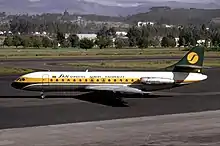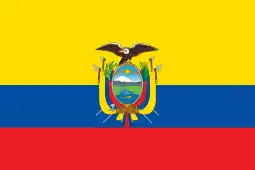SAN Ecuador
SAN (legally Servicios Aéreos Nacionales S.A.) was an airline which was based in Guayaquil, Ecuador that was the domestic branch of the airline SAETA. It was founded in 1964, and ceased operations in 1999.[1]
| |||||||
| Founded | January 21, 1964 | ||||||
|---|---|---|---|---|---|---|---|
| Ceased operations | 1999 | ||||||
| Hubs | Simón Bolívar International Airport | ||||||
| Alliance | Ecuatoriana de Aviación (1970's) | ||||||
| Fleet size | 3 | ||||||
| Destinations | 8 | ||||||
| Parent company | SAETA | ||||||
| Headquarters | Guayaquil, Ecuador | ||||||
History

SAN was founded on January 21, 1964, providing commercial services within Ecuador with two Douglas C-47As. the first routes directly connected Cuenca with Guayaquil in passenger transport operations in 1966, these operations were daily.
In 1970, the company signed an alliance with Ecuatoriana de Aviación. That same year, SAN acquired two Vickers Viscount from All Nippon Airways. Its arrival in Ecuador and entry into service marked a decided modernization of the flight equipment, which allowed the company to continue operating its usual routes and inaugurate direct flights from Cuenca to Quito and for the routes to Guayaquil to be operated with its own teams.
In 1975, three Sud Aviation Caravelle were acquired from TAP Air Portugal, two of them are put into service on the frequencies assigned between the cities of Quito and Guayaquil and one was stored in Cuenca for to serve as a source of spare parts. SAN's intention was to operate with the Caravelles to and from Cuenca, but this was not authorized by the aeronautical authorities of that time.
In 1979, SAN purchased two Sud Caravelles from Luxair, one was used in service and the other for spare parts. In this period, the Cuenca investors who had a majority decided to sell their shares to a Guayaquil businessman. By 1981, two Boeing 727-100s were incorporated, which one maintained its fleet and the other one was sold to TAME.
In the early 1990's, SAN was absorbed by Ecuadorian airline SAETA, increasing its frequencies and fleet for national and international flights. But the next years were of absolute decline until in 1999, when the company definitively ceased operations.
Destinations
.jpg.webp)
 Ecuador
Ecuador
- Cuenca (Mariscal Lamar International Airport)
- Esmeraldas (Colonel Carlos Concha Torres Airport)
- Guayaquil (José Joaquín de Olmedo International Airport) Hub
- Macas (Edmundo Carvajal Airport)
- Manta (Eloy Alfaro International Airport)
- Quito (Old Mariscal Sucre International Airport)
- San Cristóbal Island (San Cristóbal Airport)
 United States
United States
Fleet
SAN had operated the following aircraft:[2]
| Aircraft | Total | Introduced | Retired | Notes |
|---|---|---|---|---|
| Boeing 727-100 | 2 | 1981 | 1998 | |
| Boeing 727-200 | 1 | 1997 | 1999 | Operated by SAETA |
| Douglas C-47A Skytrain | 2 | 1964 | 1976 | |
| Sud Aviation Caravelle | 5 | 1975 | 1986 | |
| Vickers Viscount 700D | 4 | 1969 | 1982 | |
| Vickers Viscount 800 | 2 | 1970 | 1982 | |
Accidents and incidents
- On September 4, 1977, a Vickers Viscount (registered HC-BCL) crashed into a mountain in the Cajas Mountains, killing all 33 people on board.[3]
- On December 29, 1977, a Vickers Viscount (registered HC-BEM) crashed into a hill near Cuenca. All 24 people on board were killed.[4]
- On October 8, 1982, a Vickers Viscount (registered HC-ATV) was damaged beyond repairs after a runway excursion at Mariscal Lamar International Airport in Cuenca.[5]
- On April 29, 1983, SAN Flight 832, a Sud Aviation Caravelle (registered HC-BAJ) crashed at the southern end of the Simón Bolívar International Airport runway in Guayaquil after attempting to execute an emergency landing. The plane had suffered a engine failure shortly after taking off from Guayaquil on a flight to Quito, and the crew was returning to the airport. However, the second engine failed while overflying the city during the return and, with barely any power left and under the risk of stalling, Cap. Germán Cruz, crash-landed the plane in a muddy puddle produced by recent El Niño rain near the end of the runway, with the fuselage breaking in three parts. The accident killed 8 of the 100 people on board. The pilot had previously reported engine issues and had tested the plane the previous day, after which it was it was subjected to maintenance and was later reported as fit to fly shortly before the ill-fated flight.[6][7]
References
- "SAN at Airline Industry Update". Archived from the original on September 27, 2008. Retrieved 2008-12-18.
- "Fleet list of SAN". Retrieved December 18, 2008.
- "Accident description". Aviation Safety Network. 19770904-0. Retrieved October 8, 2009.
- "Accident description". Aviation Safety Network. 19771229-0. Retrieved October 8, 2009.
- "Accident description". Aviation Safety Network. 19821008-0. Retrieved October 8, 2009.
- "Accident description". Aviation Safety Network. 19830429-0. Retrieved October 8, 2009.
- https://www.infobae.com/america/america-latina/2023/05/13/san-832-dos-motores-defectuosos-la-amenaza-sobre-guayaquil-y-ocho-muertes-que-pudieron-ser-muchas-mas/